 The QNAP TS-963X, launched back in May earlier this year, is an affordable NAS designed for small to medium-sized businesses. Powered by an AMD quad-core 2.0 GHz processor, up to 8GB RAM (expandable to 16GB, and 10GBASE-T connectivity that supports 10G/5G/2.5G/1G/100M connection speeds, this 9-bay NAS is perfect for organizations looking to enhance their mission-critical tasks performance through increased data efficiency and network transmission speed.
The QNAP TS-963X, launched back in May earlier this year, is an affordable NAS designed for small to medium-sized businesses. Powered by an AMD quad-core 2.0 GHz processor, up to 8GB RAM (expandable to 16GB, and 10GBASE-T connectivity that supports 10G/5G/2.5G/1G/100M connection speeds, this 9-bay NAS is perfect for organizations looking to enhance their mission-critical tasks performance through increased data efficiency and network transmission speed.
The QNAP TS-963X, launched back in May earlier this year, is an affordable NAS designed for small to medium-sized businesses. Powered by an AMD quad-core 2.0 GHz processor, up to 8GB RAM (expandable to 16GB, and 10GBASE-T connectivity that supports 10G/5G/2.5G/1G/100M connection speeds, this 9-bay NAS is perfect for organizations looking to enhance their mission-critical tasks performance through increased data efficiency and network transmission speed.
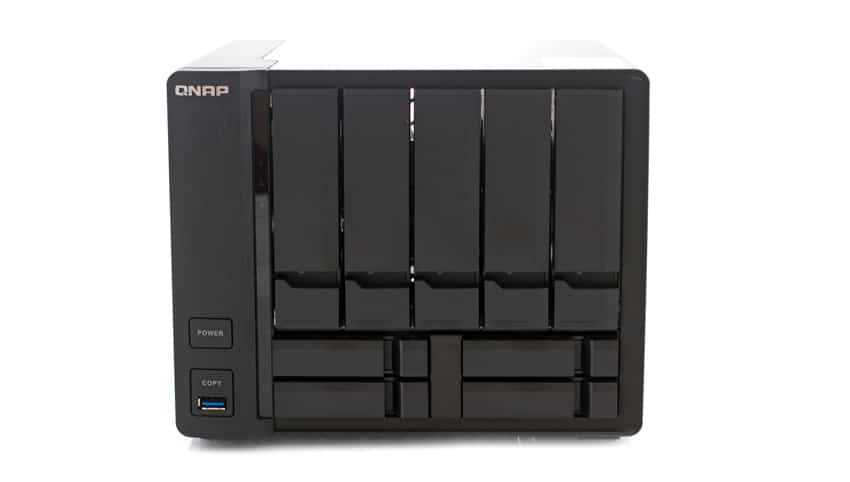
The QNAP TS-963X sports a hybrid design. Five bays are 3.5”/2.5”, able to hold HDDs or SSDs, while the other four bays use the 2.5” form factor – used to install SSDs. With this hybrid design, users can utilize enterprise-grade technology such as SSD caching, tiering, and flash volumes. With these enhancements in play, in addition to the 10GbE connectivity with the 10GBASE-T port that allows for quicker application performance (such as database transfers, virtual machine storages, and big data backups), businesses are bound to experience an accelerated workflow
The TS-963X has a list price on Amazon for $809.00 (8GB), or $659.00 (2GB)
QNAP TS-963x Specifications
| Form Factor | Tower |
| CPU | AMD G-Series GX-420MC quad-core 2.0 GHz |
| System Memory | 8GB DDR3L (1×8 GB) |
| Maximum Memory | 16GB (2×8 GB, 2 SODIMM slots) |
| Drive Bay | 5 x 3.5-inch/2.5-inch SATA 6Gb/s 4 x 2.5-inch SATA 6GB/s |
| Encryption Acceleration | AES-NI |
| Ports | |
| Networking | 1 Gigabit Ethernet Port 10 Gigabit Ethernet Port |
| USB Port | 2 x USB 3.0 (1 Front, 1 Rear) 2 x USB 2.0 (Rear) |
| Audio | 3.5 mm line-out jack, speaker, and alarm buzzer |
| Buttons | Power, One Touch Copy, Reset |
| Security Slot | Kensington security slot |
| Power | |
| Power Consumption (W) | HDD standby: 35.64W In Operation: 53.06W (fully populated) |
| Operating Temperature | 0 – 40o C |
| Humidity | 5 – 95% RH non-condensing |
| Power Supply Unit | 120W 100-240V AV adapter |
| Fan | 1 x 14cm smart fan (12V DC) |
| Physical | |
| Dimensions (H x W x D) | 182 x 225 x 224 mm 7.17 x 8.86 x 8.82 inch |
| Weight | 3.53 kg (7.78 lbs) |
| Sound Level | 17.3 dB(A) |
QNAP TS963X Design and Build
The QNAP TS-963X is very similar to the others in the 9-bay family in terms of aesthetics. The TS-963X comes with a beautiful matte-black enclosure – not uncommon to other NAS in QNAP’s line. The front has nine drive bays total, where it houses five 3.5” HDD’s and four 2.5” SSD’s. Each bay has its own locking mechanism and status LED. At the top-left of the front, you’ll see the QNAP branding. On the bottom-left, you’ll find a USB 3.0 slot, along with the USB Copy and Power button.
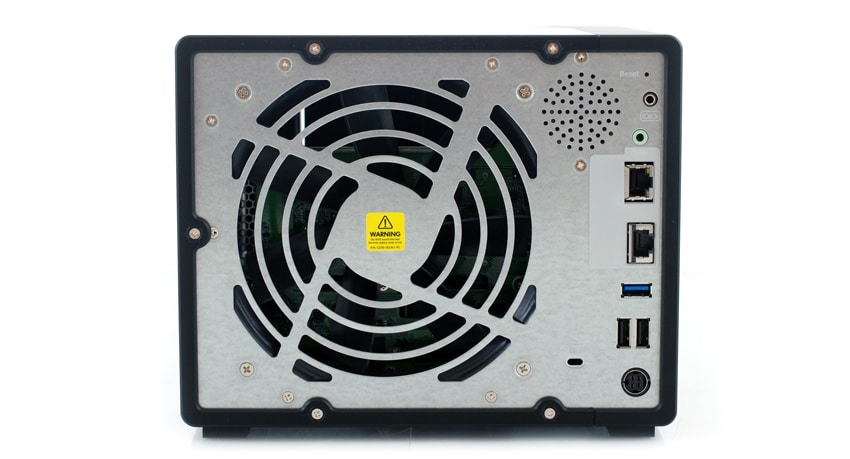
The sides of the NAS are sleek and clean, having only a small ventilation system towards the front of the NAS on the right side.
Turning the NAS around, you’ll find all of the connectivity and QNAP’s heat sink. Taking up most of the space on the back is Smart Fan. To the right of the fan is a 10GBASE-T (supporting NBASE-T), and a Gigabit LAN port. You’ll also find one USB 3.0 port, two USB 2.0 ports, 3.5 mm line-out jack, Kensington security slot, power input, and reset button.
Testing Background and Comparables for the QNAP TS-963X
We publish an inventory of our lab environment, an overview of the lab’s networking capabilities, and other details about our testing protocols so that administrators and those responsible for equipment acquisition can fairly gauge the conditions under which we have achieved the published results. None of our reviews are paid for or overseen by the manufacturer of equipment we are testing.
We tested both CIFS and iSCSI performance using a mirrored configuration, with RAID6 configuration using Toshiba N300 8TB HDDs and Toshiba HK3R2 SSDs 960GB.
Our standard StorageReview Enterprise Test Lab regimen runs the device through its paces with a battery of varying performance levels and throughput activity workloads. For the NAS, the following profiles were utilized to compare performance between different RAID configurations and different networking standard protocols (SMB and iSCSI):
- 4K 100% Read / 100% Write throughput
- 8K 100% Read / 100% Write throughput
- 8K 70% Read / 30% Write throughput
- 128K 100% Read / 100% Write throughput
Our first benchmark measures the performance of random 4k transfers comprised of 100% write and 100% read activity.
In SSD throughput, the QNAP TS-963X showed its best read and write throughput under an iSCSI (block level) configuration with 34,948 IOPS read and 16,026 IOPS write. With file-level CIFS connectivity, the TS-963X posted 4,648 IOPS read and 6,805 IOPS write. Looking at HDD performance, the RAID6 iSCSI configuration recorded 2,603 IOPS read and 429 IOPS write, while CIFS connectivity showed 163 IOPS read and 499 IOPS write.
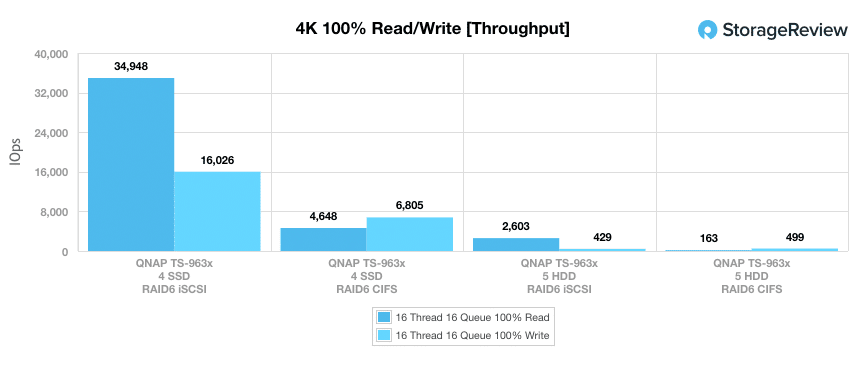
In our average latency benchmark, the QNAP TS-963X showed its overall best SSD performance with iSCSI connectivity, with 7.324ms in reads and 15.971ms in writes. CIFS showed a low latency as well, with 55.07ms and 37.62ms in reads and writes, respectively. With HDD performance, the iSCSI configuration posted 98.333ms in reads and 597.113ms in writes. CIFS connectivity showed 1,564.97 in reads and 512.01 in writes.
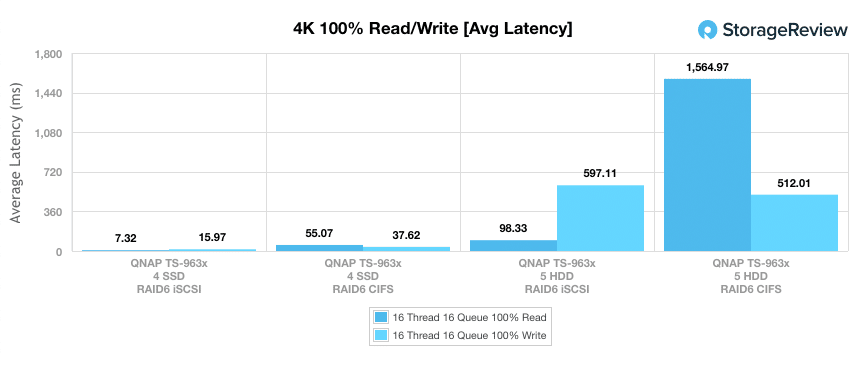
Looking at maximum latency for the QNAP TS-963X, the iSCSI configuration posted scores of 47.296ms read and 103.993ms write, and 109ms read and 571ms write using CIFS configuration. With HDD’s, we see 1,270.6ms in reads and 7,599.4 in writes using iSCSI, and 2,947ms read and 7,917ms write using CIFS.
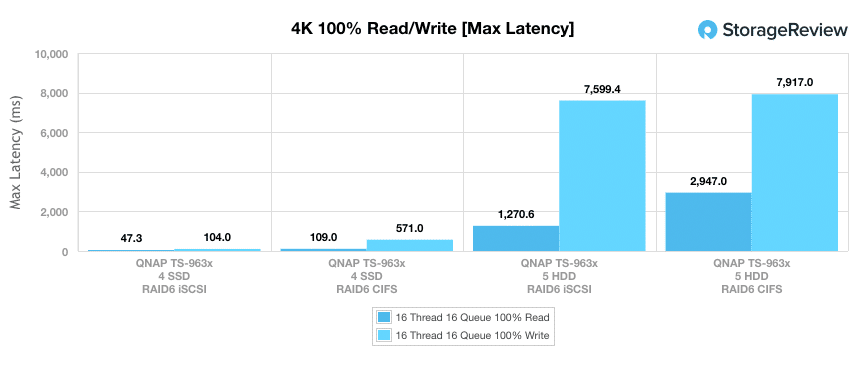
In our standard deviation section of the 4k test, which gives us a good visualization in terms of consistency, the QNAP TS-963X posted 6.472ms write and 26.106 read during iSCSI connectivity, while CIFS showed 1.88ms read and 14.98 write. With the HDD, we saw 95.407ms read and 1,080.039ms write in iSCSI, while CIFS posted a score of 130.47ms read and 932.18ms write.
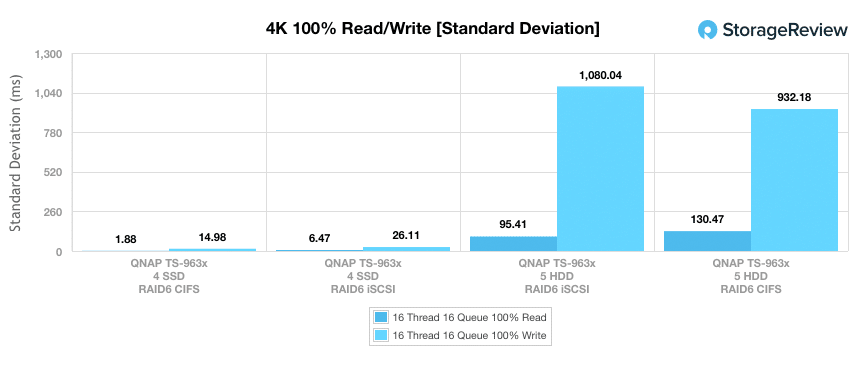
The next test again puts the drives under 100% read/write activity, this time at 8K sequential throughput. Here, gauging SSD performance under iSCSI configuration, the QNAP TS-963X showed 56,332 IOPS read and 36,045 IOPS write. CIFS showed 12,309 IOPS read and 7,852 IOPS write. The HDD iSCSI configuration outperformed the SSD’s (in read) at 60,899 IOPS, and didn’t fall far behind in writes at 35,478 IOPS. In CIFS, the HDD’s outperformed the SSD’s in both read and write, with 12,432 IOPS and 8,137 IOPS, respectively.
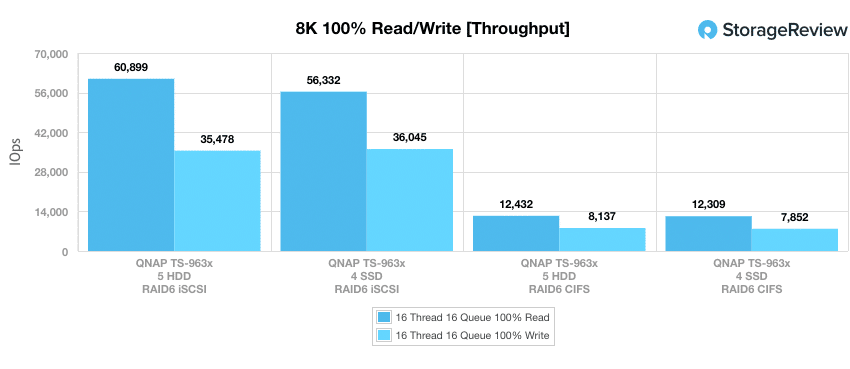
Compared to the fixed 16 thread, 16 queue max workload we performed in the 100% 4k write test, our mixed workload profiles scale the performance across a wide range of thread/queue combinations. In these tests, we span workload intensity from 2 threads and 2 queue up to 16 threads and 16 queue. Looking at throughput with SSD’s, the QNAP TS-963X posted its best performance by far in the iSCSI configuration with a range of 7,411 IOPS in burst and 19,867 IOPS in the end (16 Threads, 16 Queue). The story was similar in the HDD configuration results, with best performance in iSCSI configuration showing 400 IOPS at burst and 767 IOPS in the end.
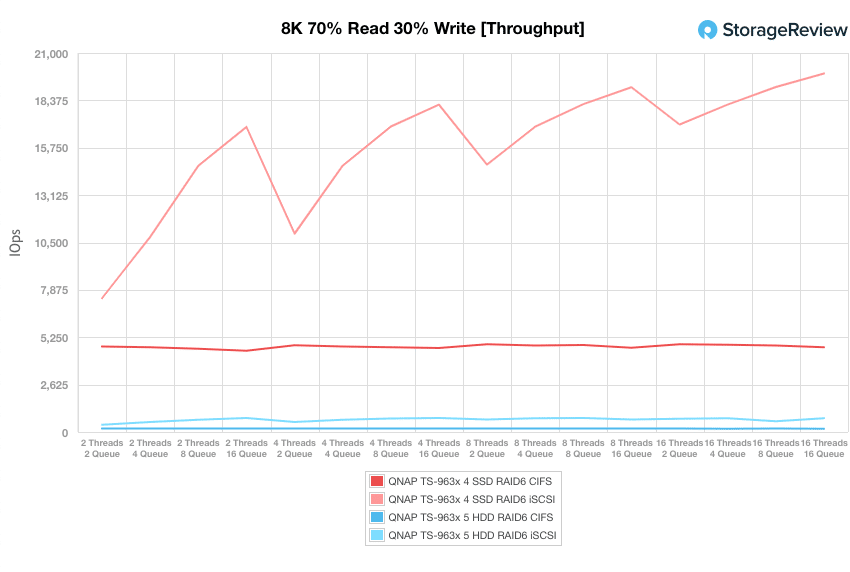
With average response times, iSCSI continues to be the best performing configuration, showing a latency range of 0.53ms through 12.88ms, while CIFS posted results of 0.84ms through 54.53ms. The trend continues with our HDD configuration, with 10ms through 332.71ms in iSCSI vs. 21.05ms through 1,359.7ms in CIFS.
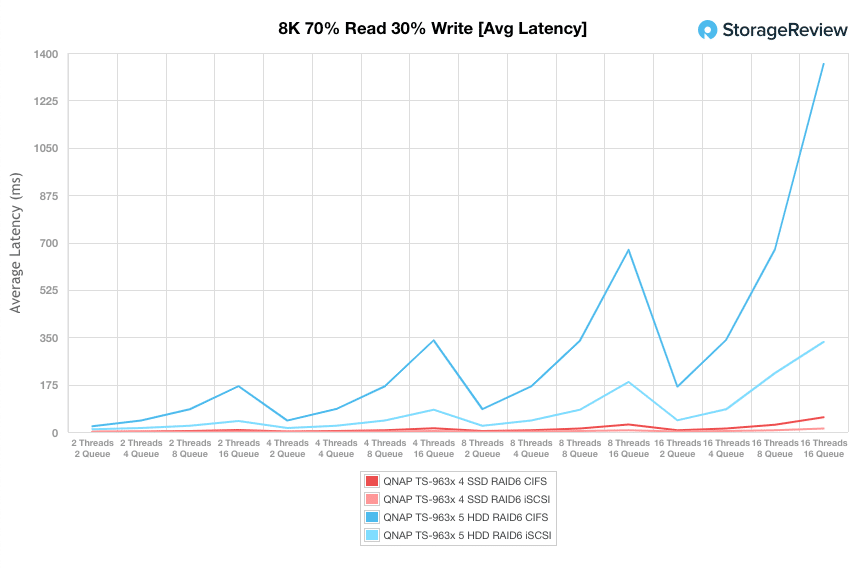
Looking at max latencies, the QNAP TS-963X continued to perform its best in the iSCSI configuration, showing 78.21ms through 142.32ms, while showing 303.48ms through 754ms in CIFS. With our HDD configuration, iSCSI showed a range of 598.87ms through 3,674.35ms, making it the best performing configuration. Looking at CIFS, we see it start out at 1,243.67ms, with a major spike to 2,936.1ms in the first queue. CIFS finished up with 4,834.4ms.
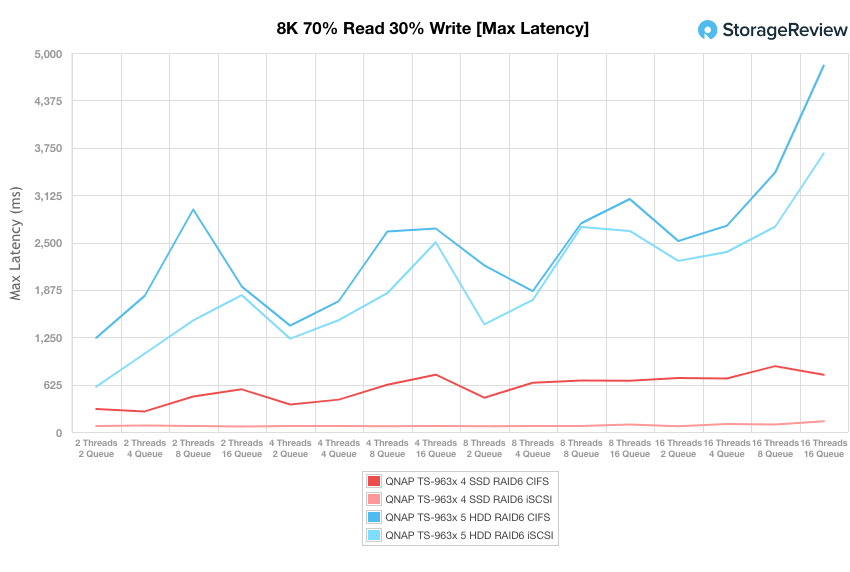
Standard deviation showed 1.71ms to 15ms in iSCSI and 2.46ms to 55.55ms in CIFS. Standard deviation with our HDD configuration showed 22.91ms to 441.83ms in iSCSI and 37.17ms to 513.84ms in CIFS.
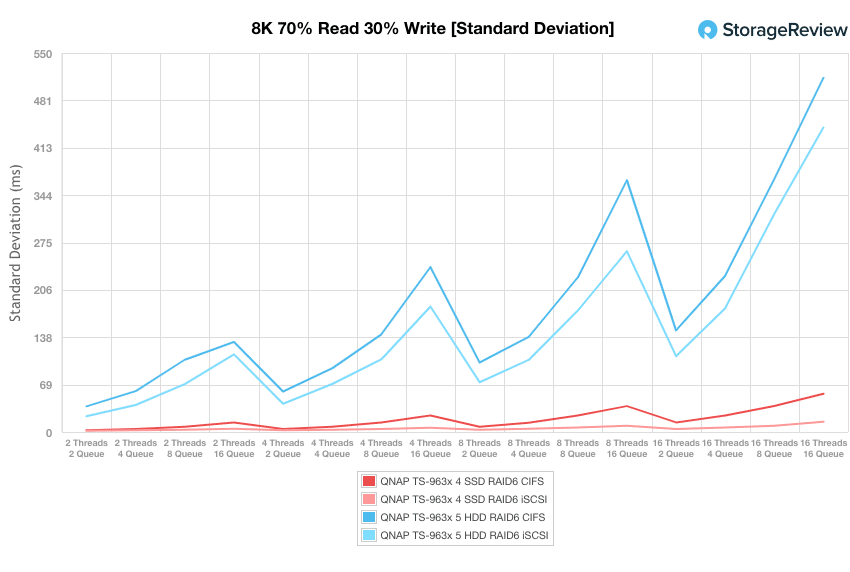
Our last workload in our small NAS Synthetic Workload testing consists of the 128k test, which is a large block sequential test that shows the highest sequential transfer speed. When looking at the 128k performance of 100% write and 100% read activity with our SSD configuration, the QNAP TS-963X hit a top write speed in iSCSI at 425,394KB/s (compared to 384,994MB/s in CIFS), but fell shortly behind in iSCSI read at 756,886KB/s, with CIFS barely taking the lead at 756,903KB/s. However, with our HDDs, iSCSI was the top performing configuration with 388,834KB/s write and 759,452KB/s read. CIFS posted a score of 373,241KB/s and 599,819KB/s in write/read, respectively.
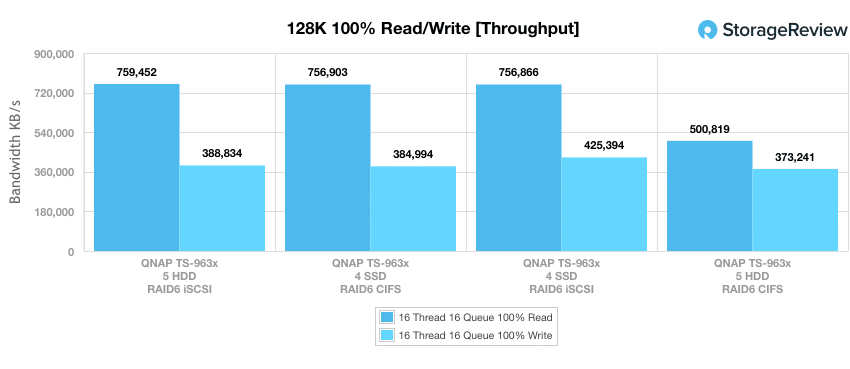
Conclusion
The QNAP TS-963X is the third installment of QNAP’s 9-bay tower NAS series; and it is a solid addition. The TS-963X is an ideal NAS for small and medium-sized businesses. Equipped with five 3.5” bays and four 2.5” bays for SSDs, utilizing features such as Tiering and Caching, along with its 10GBASE-T port for 10GbE connectivity, the TS-963X has everything a small business would need in terms of storage capacity and performance. Additionally, the QNAP TS-963X comes packed with applications such as VJBOD, Container Station, and Virtualization Station, allowing you to easily migrate existing applications to or deploy new solutions on the TS-963X.
On the subject of performance, we tested the QNAP TS-963X in configurations of both CIFS (file-level) and iSCSI (block-level). Overall, the results were very good, with iSCSI being the dominant performing configuration throughout most of the tests. In our random 4K benchmark, its top SSD performance was recorded using iSCSI, with 34,948 IOPS read and 16,026 IOPS write. However, CIFS managed to edge ahead in write performance in the HDD configuration, showing 499 IOPS write compared to 429 IOPS when using iSCSI.
When looking at 100% 8K sequential throughput, which uses a 16T/16Q load in 100% read and 100% write operations, iSCSI took a major lead over CIFS in our SSD configuration, with iSCSI posting 56,332 IOPS read and 36,045 IOPS write, while CIFS showed 12,309 IOPS read and 7,852 IOPS write. CIFS made a comeback with the HDD configuration though, jumping ahead of iSCSI in both read and write, with 12,432 IOPS and 8,137 IOPS, respectively.
During our large-block sequential test, the QNAP TS-963X recorded better results in iSCSI (using HDDs) in both read and write at 500MB/s and 373MB/s, respectively. However, iSCSI and CIFS had virtually identical results in reads with our SSD configuration, with CIFS posting 756MB/s and iSCSI showing 756MB/s.
Overall, with its impressive performance, enterprise features, 10GbE connectivity, and 9 available bays, the QNAP TS-963X would make a great addition to any small business.
Sign up for the StorageReview newsletter
